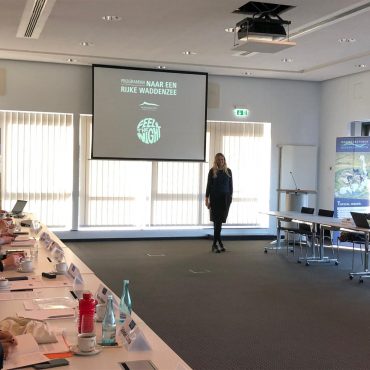The night sky in the Dutch, German and Danish sections of the Wadden Sea is still truly dark. Even here, though, light pollution is increasing, with lasting consequences for people and nature. In an effort to create awareness of this issue among local residents and companies and include the tourism perspective , we will use the Earth Hour initiative on Saturday 28 March to highlight the value of dark skies and the associated sustainable choices for the Wadden Sea (a UNESCO World Heritage Site).
The three Wadden Sea countries share a commitment to preserving dark night skies in the region. For example, the Netherlands already has two accredited Dark Sky Parks (East-Terschelling and the Lauwersmeer National Park), and both the Danish island of Møn and the German islands of Spiekeroog and Pellworm are on their way to achieving that status. Our shared aim is to develop a trilateral Dark Sky Programme to permanently emphasise the importance of dark nights in the Wadden Sea region and take joint physical measures to reduce light emissions and promote clear night-sky experiences. Earth Hour (on Saturday, 28 March), when people all over the world are invited to switch off the light to draw attention to the problem of climate change and potential solutions, is also a suitable occasion to emphasise the value of dark night skies and the associated sustainable choices.
The importance of dark nights for people and animals
Only recently, research has shown just how harmful light pollution is to biodiversity and how it affects our biorhythm. Many animals leave their shelters at night to find food, and because they feel safer in the dark. Artificial light influences animals’ behaviour. Some will get disoriented, and the light will repel certain animals while attracting others. One of the best known and most visible effects of artificial light is seen among moths. Moths are attracted by the light emitted by lamp posts and will literally fly themselves to death from exhaustion. Dark nights are also hugely important for human health. Artificial light lengthens our day and disrupts the production of melatonin, with adverse effects on the quality of sleep.
Clear starry skies
Light pollution has long been considered a minor problem. This can be explained in part by the traditional image of night and darkness. For centuries, people have tried to keep out the night. Today, people still associate light with safety and sociability, and darkness with the opposites of that. Even ecologists prefer studying things that happen during the day, rather than nocturnal phenomena. All the same, we are beginning to recognise nocturnal darkness in certain regions as a distinct value in its own right, and are also becoming aware of the economic potential associated with it. Dark nights are increasingly developing into a ‘unique selling point’ that attracts tourists keen to experience true darkness. The Wadden Sea region still offers clear starry skies, and in some nights stargazers can even see the Milky Way.
Join the effort?
Light pollution does not stop at the border, so a cross-border approach is essential. Thus far, all along the coast of the Wadden Sea only a few scattered initiatives have been set up. Hopefully, more people will be prepared to join the effort to keep our nights truly dark. Do you know any entrepreneurs who offer package holidays in the region, or are you one yourself? Please let us know. We have a lot to learn from each other in the effort to strengthen this core quality of our UNESCO World Heritage Site. Are you a representative of a municipality or organisation keen to promote dark skies in the Wadden Sea region? We would be more than happy to help you decide on the best measures to reduce light pollution.
For details please contact Nynke-Rixt Jukema (PRW).
For more information, please contact Sonja van der Graaf (PRW)


